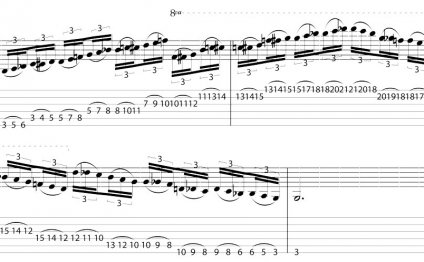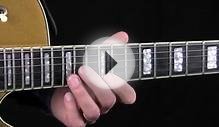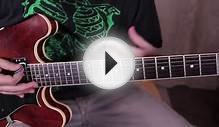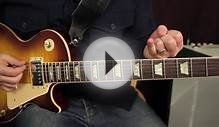
Scales Guitar lessons
|
Shown here is lots of information about the scales, including my favourite fingerings, alternative fingerings and patterns that I know are in common usage, and most importantly, the information you need to know to make music with them! :) |
So first of all, CONGRATULATIONS on making it to this page! Lot of people are scared by the word "scale" they kinda know they should learn some, but they think they're boring and hard and complicated but...
Scales are great fun when you know how to make music with them!
Before you start on learning scales it's very important you know: why you should learn a particular scale, where you can use it, how to make music with it, what pattern (or system) to learn and when to forget it!
In this series of lessons I hope to show you all that and more and get you making music out of scales as soon as possible, and realizing that they were not designed to make children hate music (which is what I thought until I was about 16) but are a really useful tool for writing, improvising and understanding music!
You'll find lots of information about the most commonly used scales and modes, including my favourite fingerings, alternative fingerings and patterns that I know are in common usage. Some of it is here as 'reference material' but these lessons are all about you making music from scales. Hope you enjoy them!
Start Here! You might save yourself a lot of time and energy!
Scale Basics
This page explains scales for beginners, explains when NOT to learn scales, help on practicing your scales effectively and also explains the differences between the various minor scales. Most guitar players will find some interesting things here no matter how new or experienced they are!
The most commonly used and important scales
The Major Scale
The foundation all Western music and music theory and is REALLY cool to use for improvising in many styles (but not great for blues!). Once you understand how it works and how to let your ears guide you, you'll love it!
The Minor Pentatonic
The scale that most people learn first and is the foundation stone of blues, rock and related music. Learn the five patterns and all the theory and usage of this scale here!
The Major Pentatonic
This scale is THE one if you want to get into your Country guitar but is also used a lot in blues and has a real sweet sound when you get to know it!
The Major Scale Modes
Often people get confused by modes but they're simple really! But don't make the mistake of learning them early - be sure you are confident improvising with The Major Scale over diatonic chord sequences first.
For those getting into jazz, fusion, classical and the explorers!
The Melodic Minor
It's the modes of this scale that are more often used than in it's most pure form, but it's a very useful scale to know if you are getting into jazz guitar. Not really used much in blues and rock.
The Harmonic Minor
Very useful in certain jazz progressions and if you want to play neo classical music (Yngwie and co) but not so useful for anyone else to be honest. So make sure you know why before you start learning it!
Symmetrical Scales (coming soon).
The Whole Tone and the Diminished scales are great for 'playing outside' on V chords. If that doesn't make sense, don't go here yet, you don't need them!
Other strange scales (maybe one day)
Only learn scales when you know that you need to use them! If you are looking at doing more advanced scale concepts, like say The Lydian Chromatic Concept For Tonal Organization For Improvisation by George Russell then you should not need my help figuring out the scales. Really interesting book btw, if you are into full on experimental theories, though when I bought it I remember it cost a fortune, and though it's an interesting read, I never really used any of it!
Other Scale Info
SC-150 • Scale Comparison Chart (REFERNCE for ADVANCED students)
This chart will show you the notes in all the common scales and modes, so you can compare them and start to understand the different ways that each scale is used. This is NOT FOR BEGINNERS - this is for more advanced players.
SC-160 • Relationships between notes and chords
This is another NOT FOR BEGINNERS lesson, maybe aimed at people looking at the Major scales, scale construction and perhaps even making up scales. Also useful for analysis of jazz solos when you have that eternal question "why are they playing this note over that chord?" :)
YOU MIGHT ALSO LIKE



Share this Post
Related posts
Bass Guitar Lessons Scales
They build strength and independence in your fingers. Playing scales helps to train you ears to recognize some common note…
Read MoreEasy Blues Guitar Lessons
Are you experienced? Easy blues guitar is a great place to start If your not. Possibly the most versatile, easy to play form…
Read More
 Learn guitar theory. An introduction to applying music theory to the guitar fretboard. How learning about guitar scales, chords and chord progressions can benefit intermediate and advanced guitar players. Guitar lessons include playing songs with...
Learn guitar theory. An introduction to applying music theory to the guitar fretboard. How learning about guitar scales, chords and chord progressions can benefit intermediate and advanced guitar players. Guitar lessons include playing songs with...










